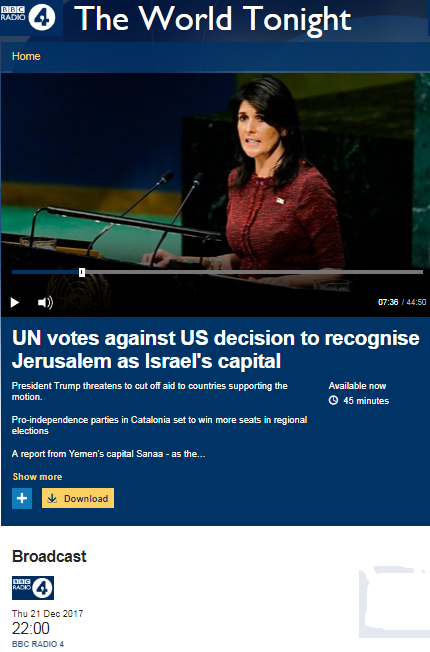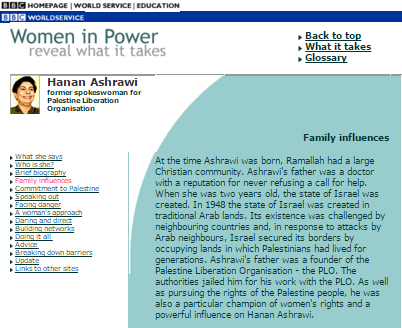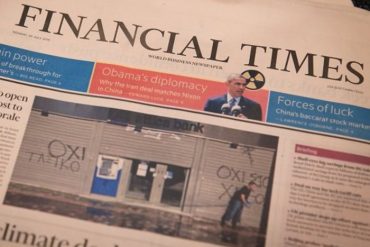In part one of this post we looked at the BBC News website’s coverage of the session held at the UN General Assembly on December 21st. In part two we discussed BBC World Service radio’s reporting of that story and in this post we will look at coverage of the same topic on BBC Radio 4, beginning with a programme aired before the vote took place.
1) ‘PM‘, BBC Radio 4, 21/12/17, presented by Eddie Mair, from 05:22 here.
Mair: “During the campaign that got him elected president, Donald Trump said he wanted to stop sending aid to ‘countries that hate us’. Now he seems close to putting that idea into practice. The catalyst was his announcement that the US would relocate its embassy in Israel from Tel Aviv to Jerusalem. Today the General Assembly of the United Nations will vote on a resolution that expresses great regret about the decision and urges other countries not to follow America’s decision to relocate. In advance of the debate the US ambassador to the UN, Nikki Haley, warned that the US would take note of countries which voted against America.”
Mair then quoted statements made by Haley and listeners heard a recording of the US president speaking on the same topic before a rather confused Nada Tawfik was brought in to report from the UN.
Tawfik: “This has been a week of high stakes diplomacy on the issue of Jerusalem. It began on Monday when the United States vetoed a draft Security Council resolution that essentially called on President Trump to reverse his decision and to…reverse his decision to move the capital of Israel…ah…to recognise Israel as the…Jerusalem as the capital of Israel, to move the American embassy there. Arab and Muslim countries immediately requested an emergency session of the General Assembly to protest the veto and to put forward another resolution for all 103 [sic – 193] members of the General Assembly to vote on. President Trump and Ambassador Haley have tried to use American muscle rather than diplomacy to convince countries to vote their way.”
Tawfik also told listeners that:
“Here [at the UN], diplomats say […] that it’s clear that the US decision goes against international law and therefore countries should stand up at the UN General Assembly.”
Which countries those unidentified quoted diplomats represent was not revealed by Tawfik but nevertheless, she chose to unquestioningly promote the inaccurate notion that the US recognition of Jerusalem as Israel’s capital “goes against international law”.
In the same item listeners heard the recordings of the statements made by Nikki Haley and the Turkish foreign minister previously aired on BBC World Service programmes as well as a recording of Israel’s ambassador speaking at the UN GA. The item also included an interview with “an expert on international aid” – Cindy Wang – described as having worked at the US State Department under the previous US administration.
Radio 4 also covered the story after the UN GA vote had taken place.
2) ‘The World Tonight’, BBC Radio 4, 21/12/17, presented by Shaun Ley, from 07:30 here.
Ley: “For Christians, Jews and Muslims alike it is a city of deep religious significance. Richard the Lionheart – England’s crusader king – dreamt of liberating Jerusalem during the Crusade but died without achieving his ambition. Palestinians maintain that East Jerusalem should be the capital of the State of Palestine, if such a state ever comes into existence. Israel – the Jewish state – has proclaimed that Jerusalem is its capital: a status not recognised by most of the nations of the world. So this result – today’s vote by the General Assembly of the United Nations – will have come as no surprise to the White House.”
Listeners heard the previously used recording of part of statements made by the US ambassador to the UN followed by the recording of remarks from the Turkish foreign minister also previously aired on other programmes which was introduced by Ley as follows:
Ley: “Turkey, traditionally a US ally, was one of the prime movers behind today’s motion. The Turkish foreign minister Mevlut Cavusoglu hit out against threats from President Trump to punish countries that support the resolution.”
In addition, listeners heard the first segment of the interview with the Saudi Arabian ambassador to the UN broadcast on ‘Newshour’ on the BBC World Service.
Ley then introduced his first guest.
Ley: “Well this evening Turkey’s president Recep Tayyip Erdogan has Tweeted that as a result of the overwhelming vote he expects President Trump to rescind what he called his unfortunate decision. Gulnur Aybet is professor of international relations at Yildiz Technical University – a senior advisor to the [Turkish] president. […] Your president says he expects it to be rescinded but in the end, today’s vote was a symbolic one: the motion has no authority to cause the Americans to change their policy. All it seems to do is sour relations with the US but actually change nothing.”
Aybet: “Well actually I mean the General Assembly vote is non-binding but at the same time, when you look at this it’s an overwhelming majority of various states from very different backgrounds. So you’ve got the entire Muslim states of the UN there. You’ve got the major economies of the world there and all the other permanent members of the UN Security Council. Now it’s really the first time that such a diverse range of states – and some very powerful ones – have actually taken a decision in an international institution against the United States in such an overwhelming way. I think it’s more than symbolic in the way that it challenges the US’ presence on the world arena.”
In response to Ley’s assertion that the UNGA vote “is endorsing a position the UN has had for 70 years” and that the motion will “simply add to the conflict”, Aybet responded as follows:
Aybet: “No, but what the American decision, taken by the Trump administration, is actually a violation of international law. And you mentioned that, you know, this is the status quo that’s happened and the United Nations in various resolutions – Security Council – has called these lands, including East Jerusalem, as occupied territories and required a respect for the special status of Jerusalem. So on one side there’s the international law which, you know, is there – you can’t deny that – and the United States has actually broken with that by making this decision – and which is why there is such an overwhelming response to it – but it’s also pitted the entire Muslim world against it and President Erdogan said this was an absolute red line and that’s precisely why Turkey as the chair of the OIC – the Organisation of Islamic Cooperation…”
Ley: [interrupts] “Pushed very hard to get this motion….”
Aybet: “Well they actually, Turkey…”
Ley: “Lobbied for it, encouraged it.”
Aybet: “…convened an emergency summit of the OIC. And it was the resolution that came out of that summit that laid the basis for this resolution.”
In response to Ley pointing out that both the US president and the US ambassador to the UN had clarified that the US announcement “does not preclude anything that might come out of peace talks”, the Turkish president’s advisor once again made inaccurate – but unchallenged – claims concerning the US announcement and international law.
Aybet:”How can you have a peace process when this decision violates international law on which the peace process is based and the two-state solution which is what the two…what the peace process is all about and the entire [sic] international community which have voted against this decision respects? And how can you have a peace process when you’ve pitted the entire Muslim world against this decision as well, you know?”
While Ley made no attempt to relieve listeners of the erroneous impression promoted by Aybet according to which the US decision to recognise Jerusalem as Israel’s capital breaches international law, he did allow her the time to praise her employer’s “leadership […] that will not be forgotten”.
Ley’s second interviewee on the topic was retired US general and former vice Chief of Staff Jack Keane. During that conversation, Ley referred to Nikki Haley’s statement at the UN GA as “kind of almost cash for votes” and “tawdry”.
Like BBC World Service radio, Radio 4 focused extensively on what it chose to portray as “threats” made by the US Administration prior to the UN GA vote and failed to provide audiences with relevant context and historical background to the story. However, as we see, listeners to BBC Radio 4 also heard inaccurate claims concerning ‘international law’ and the US announcement recognising Jerusalem as Israel’s capital in both these programmes.
All the relevant UN Security Council resolutions are non-binding (Chapter VI) and do not create any legal obligations. Neither do they relate to announcements concerning Jerusalem.
Clearly BBC Radio 4 listeners were materially misled on this issue and corrections are in order.
Related Articles:
Reviewing BBC coverage of the UN GA Jerusalem vote – part one
Reviewing BBC coverage of the UN GA Jerusalem vote – part two
How did BBC radio frame the US announcement on Jerusalem?




